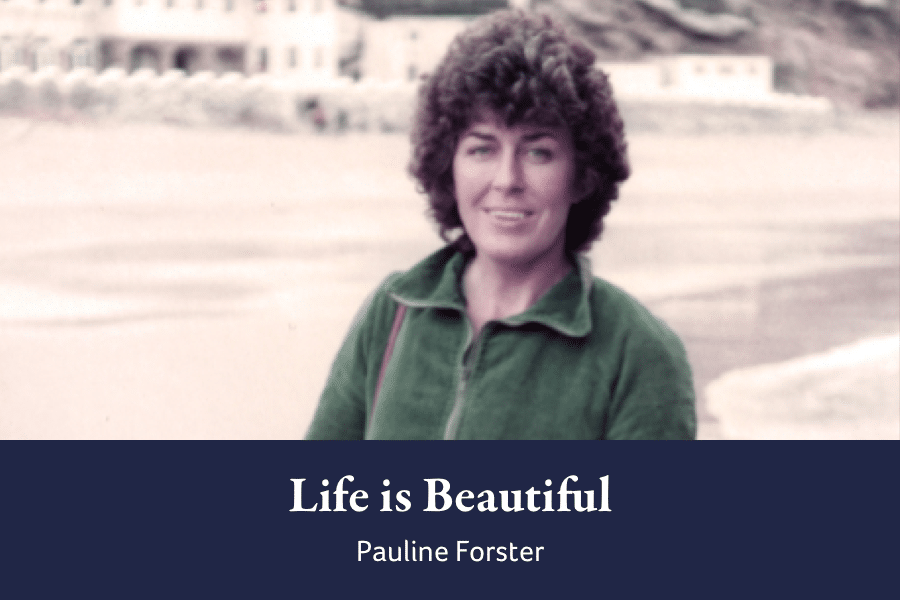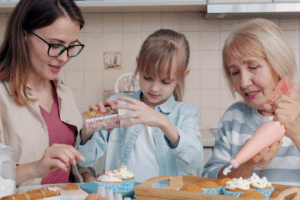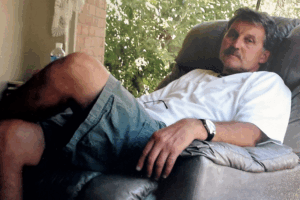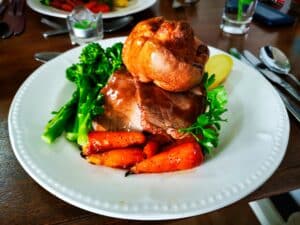Imagine that you’re a 10-year-old girl who is struggling to walk and who has to be carried to school by your mother. Imagine that you are taken backwards and forwards to hospital to try to learn what is wrong with you, only for the doctor to snap at your mother, “Make the child walk!”
Then imagine that, months later, your mother receives a letter, saying that you need to be admitted for further tests after an X-ray of your ankle highlighted a problem. And imagine the horror of being told, as that young girl, that you had tuberculosis and that the doctors wanted to amputate your leg.
Pauline Forster’s mother, not surprisingly, fainted on being given that news. Fortunately, Pauline herself was treated without the need for such drastic surgery, although she did have to spend a year in hospital, another year on crutches, and almost two years with a caliper.
Leaving school without qualifications
For three years, between the ages of 11 and 14, Pauline could not attend school. Not surprisingly, she left school without any qualifications, though what she lacked in certificates she made up for in spirit. Fibbing that she had lost her school-leaver’s certificate, she talked her way into a job at the Joplings store in Sunderland, England, where she was given a position in the paper-pattern department. With reams of materials passing through her section, she was able to make her own dresses for free. As Pauline recalls, “I remember making up a pink skirt without zips which was so tight that my father strictly forbade me to go out wearing it.” Well, it was 1960 …
After just 10 months in this job, a friend persuaded Pauline to apply to become a nurse. Her boyfriend (and husband-to-be), Bob, encouraged her in this, and, in May 1961, a few months after her 17th birthday, she started as a cadet at Sunderland Royal Infirmary, working a year on the wards before commencing her training. This was something she enjoyed.
Pauline continued her nursing as she married Bob and raised her two sons. She became a district nurse, although she confesses to a number of on-the-job “incidents” with her various cars, including one occasion when she drove through a section of wet concrete which then solidified to the bottom of her vehicle!
Exams, a degree, and further studying
Pauline later took a position as a district-nurse teacher before switching to become a health visitor, a move that required her to go back to school to finally obtain some O level qualifications. She successfully studied for her biology and English-language qualifications, and she then undertook a course in obstetrics.
“All this was only about 40 years ago, but it feels like a different world to today,” reflected Pauline on her work as a health visitor. “A number of the people we saw were living below the poverty line, and many hadn’t been given the necessary education to understand health issues. I visited a family whose third child had developed a horrible nappy rash. I said to the mother, ‘I think you’ll need to start using disposable nappies.’ ‘But Mrs. Forster,’ she said, ‘do I buy nappies, or do I buy food?’”
Pauline decided to push herself further. After opting to become a fieldwork teacher, she studied for a degree in post-16 education at night school, graduating with a 2:2, and took Open University courses whenever she could find the time. Boosted by her growing list of qualifications, Pauline moved her career in a different direction, taking the role of coordinator at the local Child Development Unit (CDU)—a joint venture between education, social services, and health. There, she managed a team of six.
Health problems take their toll
Health issues and a near 10-hour operation caused Pauline to retire from work at the age of 50, but she remains sanguine about this.
“Generally,” Pauline says, “I’ve enjoyed 30 years of good health since my last surgery, and I’ve appreciated every one of them.”
This is not to say that Pauline was about to put her feet up, of course—she quickly became involved with the Women’s Royal Voluntary Service. She and her loving husband, Bob, also spent as much quality time as possible with the sons they are both so proud of and their growing families.
Pauline titled her LifeBook Life is Beautiful. She explains, “I know that life isn’t always beautiful for everybody, and it hasn’t always been beautiful for us, but overall, life is beautiful, and we have to be grateful for that.”
A love of family and friends
Pauline’s life story is one that is full of love for family and friends. It is also one which demonstrates her determination to overcome the difficulties that she has faced and to live a full and happy life.
In her conclusion, Pauline reveals that it was her sons who asked her to write her book, and she confesses, “I hope not to have disappointed them.”
She can be very confident indeed that she has not done so.

Written by Stephen Pitts, LifeBook Memoirs editor




